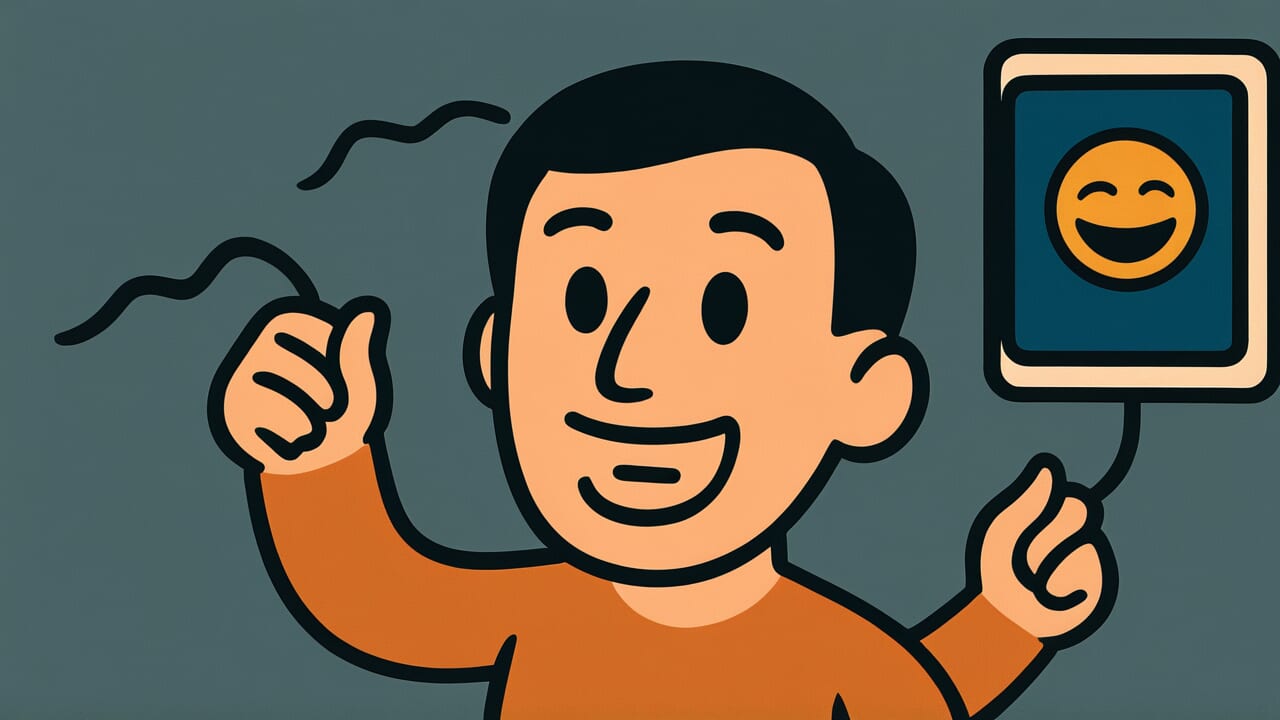How to Read “A suspicious person’s empty laugh”
Kusemono no sorawarai
Meaning of “A suspicious person’s empty laugh”
“A suspicious person’s empty laugh” refers to the thin smile worn by someone hiding bad intentions or schemes. This proverb warns us to be careful around people whose true thoughts are hard to read.
This proverb applies when someone smiles at you, but their laugh feels hollow and insincere. You might sense they’re planning something behind that friendly face.
It describes people who act friendly on the surface while secretly thinking something completely different.
You might use this in business negotiations or when meeting someone new who seems too friendly. Or when someone smiles but their eyes don’t match their expression.
You could say, “That person’s empty laugh bothers me” to express your wariness. It’s an effective way to show you’re being cautious.
Even today, we often meet people whose expressions don’t match their true feelings. This proverb reminds us not to judge people by appearances alone.
It teaches us to carefully figure out what someone really means. This wisdom remains valuable in modern life.
Origin and Etymology
No clear written records explain where “A suspicious person’s empty laugh” came from. However, we can learn a lot by looking at the words themselves.
“Kusemono” (suspicious person) originally meant “crooked person.” It refers to someone whose heart isn’t straight – someone with bad intentions or schemes.
During the Edo period, people called thieves or suspicious figures sneaking around at night “kusemono.” You might remember scenes from period dramas where someone shouts “Kusemono da!” (There’s a suspicious person!).
“Sorawarai” (empty laugh) means a laugh that doesn’t come from the heart. It’s only surface-level.
The character for “sora” (empty) means “hollow” or “without content.” An empty laugh is a laugh without real emotion behind it.
These two words combined create “A suspicious person’s empty laugh.” It describes the creepy smile that someone with bad plans wears to hide their true intentions.
This expression teaches the importance of seeing through people’s real intentions in relationships. Some believe it came from times when reading people’s hidden thoughts could mean life or death.
This might include the merchant world or samurai society. Our ancestors sharply captured in words their wariness toward people whose expressions and hearts don’t match.
Usage Examples
- That salesman was rushing me to sign while wearing a suspicious person’s empty laugh, so I decided to check the terms again
- She was giving me compliments, but her suspicious person’s empty laugh made me want to find out what she really thought
Universal Wisdom
“A suspicious person’s empty laugh” has been passed down because it shows deep insight into human duality. Everyone has moments when their true feelings and expressions don’t match.
But when this becomes constant, when it becomes a tool to hide schemes or bad intentions, that laugh becomes an “empty laugh.”
Why do people hide their true feelings behind a smile? To protect their weaknesses or desires.
They want to catch others off guard, hide their intentions, or secure an advantage. When such calculations take over, a person’s smile becomes a mask.
What’s interesting is that this proverb uses the word “kusemono” (suspicious person). Not “villain” but “suspicious person.”
This assumes no one is born evil. People’s hearts become crooked through experiences or circumstances. And a crooked heart can’t create a straight smile.
This proverb teaches the importance of being careful in relationships. But it also tells a sad story about human nature.
It shows how difficult it is to build relationships where you can truly laugh from the heart. And how precious such relationships are.
In a world overflowing with surface smiles, genuine smiles stand out even more. Our ancestors may have put into these words not just the ability to see through people, but also the importance of seeking true relationships.
When AI Hears This
Laughter as a signal contains an interesting paradox. Real laughter leaks out naturally, but that’s exactly why fake laughter is easy to create.
This creates what signal detection theory calls a “false positive” problem.
In signal detection theory, not just signal strength matters, but also how often that signal appears. If a fire alarm rings every day, no one will believe it during a real fire.
A suspicious person’s empty laugh works the same way. When someone laughs too often without reason, the receiver’s brain judges “this person’s laugh isn’t trustworthy.” The detection threshold rises.
What’s interesting is that people who empty laugh thinking more laughter increases likability actually create the opposite effect. Statistically speaking, the signal-to-noise ratio worsens.
The precious signal of real laughter gets buried under masses of fake laughter.
Even more ironic, the suspicious person often mistakes their empty laugh as “working well.” Why? Because others still interact with them normally on the surface.
But inside the other person’s brain, the alert level quietly rises. This is a defensive response to avoid false negatives – missing real danger.
Lessons for Today
“A suspicious person’s empty laugh” teaches modern people the importance of insight that isn’t fooled by surface impressions. Smiling photos flooding social media, business pleasantries, excessive friendliness when first meeting someone.
You could say modern society is full of “empty laughs.”
But this proverb doesn’t really want you to become paranoid. Rather, it emphasizes the importance of trying to understand someone’s true intentions.
Why does that person empty laugh? Maybe they’re just hiding anxiety or nervousness. It might be self-defense, not bad intentions.
At the same time, this proverb is a question for yourself. Is your smile genuine? Have you made hiding your true feelings a habit in relationships?
What matters is both having eyes to see through others’ empty laughs and making effort to build relationships where you don’t need to empty laugh. Between people you trust, smiles without calculation naturally appear.
Having as many such relationships as possible – that’s the most valuable lesson this proverb gives to you living in modern times.



Comments